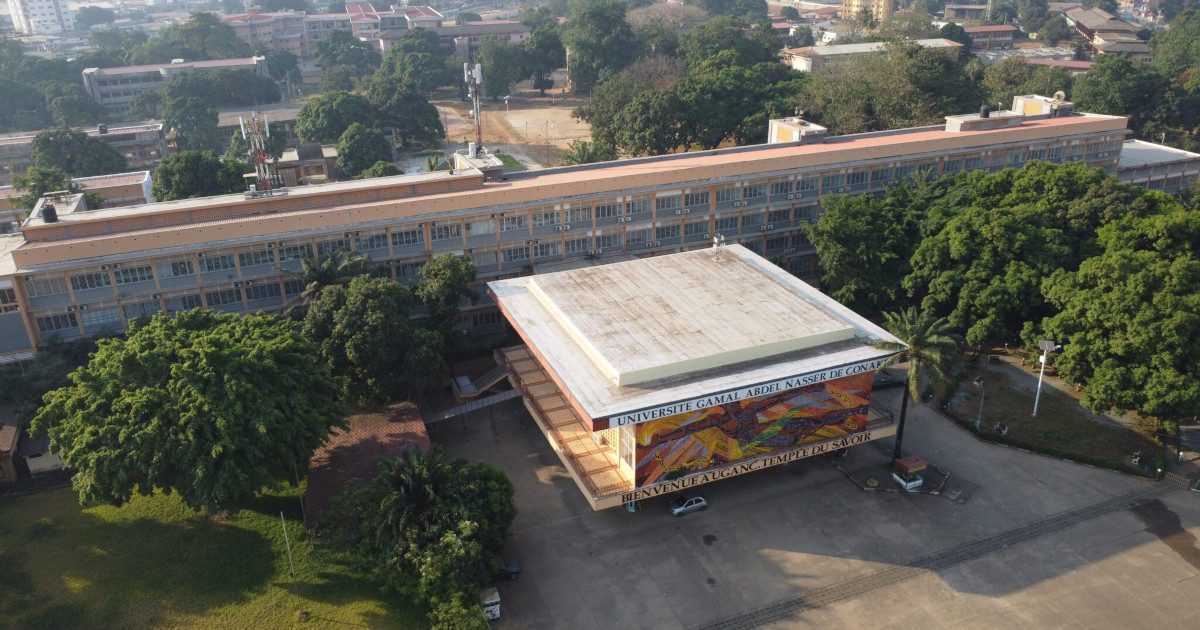This article produced by Afriscitech was published by NewsTank Education & Research on January 28, 2025. It is reproduced with the kind permission of NewsTank. It has been translated in English by Afriscitech
The Gamal Abdel Nasser University of Conakry (UGANC) has been accredited by the French High Council for Evaluation of Research and Higher Education (Hcéres) since October 2024. In addition to the institution itself, several degrees are also accredited by the French body: the master’s degree in public health and the master’s degree in microbiology and immunology, joint degrees from the UGANC and the CEA-PCMT (African Center of Excellence for the Prevention and Control of Communicable Diseases).
These accreditations are part of the strategy of the university’s rector, Alpha Kabinet Keita, since his arrival in February 2022. “From the moment I took office, I have been working to bring the UGANC into compliance with the requirements of the Ministry of Higher Education, Scientific Research and Innovation: all higher education institutions must be authorized to award degrees, which must themselves be part of accredited programs,” he told News Tank’s Africa bureau on January 28, 2025.
Between 2022 and 2024, the Anaq (Guinea’s National Quality Assurance Agency), created in 2017, accredited 36 out of 43 programs and authorized the university to award 72 degrees. “This process has shown us that accreditation is beneficial in terms of improving practices and quality,” according to Alpha Kabinet Keita. “As we had been drafting our international outreach policy at the same time, we thought it would be useful to seek evaluation from a non-Guinean entity.”
An international evaluation
The presence within the UGANC of the CEA-PCMT, funded by the World Bank, encouraged and facilitated this international accreditation process. The CEAs are tasked with participating in the life of the institutions that host them, and in particular with improving the quality of teaching and research.
A specific budget allocated by the World Bank made it possible to launch a call for proposals for the accreditation of the UGANC and its two joint master’s programs, at the end of which Hcéres was selected.
The Hcéres evaluation focused on six criteria:
- Definition of the institution’s strategy.
- Governance and mechanisms for implementing the strategy.
- Research policy.
- Innovation policy and societal impact.
- Training policy.
Launched in June 2024, this evaluation culminated in October 2024 with the decision to grant accreditation for three years to the UGANC as a whole and for five years to each of the master’s programs. These decisions were made public in mid-January 2025. The reports will soon be published on the Hcéres website.
Hcéres recommendations
The UGANC accreditation is accompanied by six recommendations for the future:
- Create a dedicated research service, shared with research centers, to support researchers in setting up projects and governance for management.
- Continue to regionalize the training offer and involve research structures.
- Commit to a human resources master plan to meet the skills challenges of the project.
- Formalize a system for welcoming international students outside of organized mobility programs.
- Promote student involvement in cultural and sports activities within training programs.
In addition, Hcéres calls for a redefinition of the relationship between the UGANC and the Guinean government, with a view to greater autonomy for the university in terms of both objectives and resources.
The master’s accreditations are also accompanied by recommendations, including the development of a slightly less theoretical curriculum with more practical teaching and internships. The promotion of the English language and sustainable development are also suggested.
The benefits of accreditation
For the rector of Gamal Abdel Nasser University in Conakry, this international accreditation has several virtues:
- “it highlights the strengths, weaknesses, threats and opportunities of UGANC, which makes it possible to take action to consolidate what is working and improve what is not”;
- “it strengthens the confidence of young Guineans in the quality of the degrees we award: UGANC is competitive on an international scale”;
- “it can help reduce prejudice about the real level of our graduates who go on to study at foreign universities: today, it is not uncommon for a European university to ask a Guinean master’s degree holder to repeat a year of master before starting a doctorate“;
- ”it will promote collaboration with other higher education institutions around the world“;
- “It will facilitate access to international funding from the World Bank and other organizations. ”
In the future, he hopes to seek international accreditation for other degrees. However, this process remains limited by the university’s budgetary constraints.
Hcéres’ activities in Africa
In 2024, Hcéres’ activities in Africa included:
- 32 programs evaluated, including 30 accredited (most of these programs were in science, technology, engineering, and mathematics);
- 4 institutions evaluated, all accredited.
Gamal Abdel Nasser University
Founded in 1962 as the Conakry Polytechnic Institute, it took its current name in 1989. At the beginning of 2025, it had 4,840 students.
It offers 45 programs:
- 23 initial and short-term training programs (bachelor’s degrees, state doctorates, inter-university diplomas, specialized study diplomas);
- 10 master’s programs;
- and 12 doctoral programs.
It is structured into five faculties and institutes:
- the Polytechnic Institute;
- the Railway Institute;
- the Faculty of Science;
- the Faculty of Health Sciences and Technology;
- and the IT Center.
It is home to two doctoral schools:
- science and technology;
- life, health, and environmental sciences.




